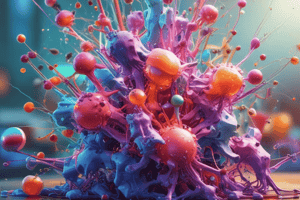Podcast
Questions and Answers
What is the main focus of electrochemistry?
What is the main focus of electrochemistry?
How do Faraday's laws of electrolysis contribute to electrochemistry education?
How do Faraday's laws of electrolysis contribute to electrochemistry education?
Which technology enables the generation of electricity through redox reactions?
Which technology enables the generation of electricity through redox reactions?
What is the primary focus of bioelectrochemistry as a branch of electrochemistry?
What is the primary focus of bioelectrochemistry as a branch of electrochemistry?
Signup and view all the answers
How does understanding the interplay between physical chemistry and electrochemistry benefit research?
How does understanding the interplay between physical chemistry and electrochemistry benefit research?
Signup and view all the answers
What aspect of chemical reactions do researchers focus on when bridging physical chemistry and electrochemistry?
What aspect of chemical reactions do researchers focus on when bridging physical chemistry and electrochemistry?
Signup and view all the answers
What is the main focus of Physical Chemistry?
What is the main focus of Physical Chemistry?
Signup and view all the answers
Which tool in Physical Chemistry helps predict whether reactions will occur spontaneously?
Which tool in Physical Chemistry helps predict whether reactions will occur spontaneously?
Signup and view all the answers
What does Quantum Chemistry mainly focus on?
What does Quantum Chemistry mainly focus on?
Signup and view all the answers
In Physical Chemistry, what does the Gibbs free energy ($G$) describe?
In Physical Chemistry, what does the Gibbs free energy ($G$) describe?
Signup and view all the answers
Which branch of chemistry applies quantum mechanical principles to study atomic and molecular structures?
Which branch of chemistry applies quantum mechanical principles to study atomic and molecular structures?
Signup and view all the answers
What significant concept in physical chemistry helps explain phase transitions and intermolecular forces?
What significant concept in physical chemistry helps explain phase transitions and intermolecular forces?
Signup and view all the answers
Study Notes
Discovering Chemistry's Physical World and Electric Wonders
Chemistry is the science of matter and its transformations. It encompasses two significant branches—Physical Chemistry and Electrochemistry—that focus on understanding the behaviors of molecules, atoms, and electrons within this realm. Let’s delve into these fascinating domains together, unraveling their concepts without jargon while maintaining scientific accuracy.
Physical Chemistry
Physical chemistry is concerned with studying the relationships between energy changes, thermodynamics, kinetics, equilibrium, statistical mechanics, and properties of particles like gases, liquids, solids, plasma, and solutions in chemical systems. Its fundamental principles help us explain various phenomena such as reaction rates, phase transitions, intermolecular forces, spectroscopy, and chemical equilibria.
One essential tool in physical chemistry is the thermodynamic property called Gibbs free energy ($G$). This function describes the maximum reversible work obtainable from a closed system at constant temperature and pressure during isothermal-isobaric processes. Understanding $G$ helps predict whether reactions will occur spontaneously and allows scientists to optimize industrial chemical processes.
Another significant area of physical chemistry is quantum chemistry, which applies quantum mechanical principles to describe atomic and molecular structures, electronic energy levels, and interactions between them. Quantum chemistry has made remarkable strides, enabling chemists to compute molecular geometries and electronic spectra using computational methods, providing insights into complex chemical systems beyond experimental capabilities.
Electrochemistry
Electrochemistry, arguably one of the most technologically relevant fields within chemistry, studies the relationship between electrical and chemical changes occurring during redox reactions involving electrodes immersed in electrolyte solutions. These systems can generate electricity through a device termed a battery, store it via a capacitor, or convert chemical energy to another form using fuel cells.
Understanding Faraday's laws of electrolysis constitutes a cornerstone of electrochemistry education. These laws govern the relation between current flow, mass change, and charge transfer occurring during electrochemical reactions. For instance, Did you know that electroplating is based on controlled deposition of metal onto objects using electrochemical techniques?
Bioelectrochemistry, a branch of electrochemistry focused on understanding bioelectricity production by living organisms such as bacteria and plants, expands our knowledge of natural processes and provides exciting opportunities for developing new technologies.
Bridging Physical Chemistry and Electrochemistry
The interplay between physical chemistry and electrochemistry offers a comprehensive view of nature, materials, technology, biology, and human welfare. By understanding the underlying physics and chemistry of electron transfers and energetic aspects of chemical reactions, researchers advance knowledge, develop novel applications, and solve global challenges like renewable energy storage systems and sustainable waste management practices.
Studying That Suits You
Use AI to generate personalized quizzes and flashcards to suit your learning preferences.
Description
Explore the realms of Physical Chemistry and Electrochemistry in this quiz, uncovering the fundamental principles and applications of energy changes, thermodynamics, kinetics, electrochemical reactions, and more. Delve into topics like Gibbs free energy, quantum chemistry, Faraday's laws of electrolysis, and bioelectrochemistry to deepen your understanding of matter transformations and electrical phenomena.




